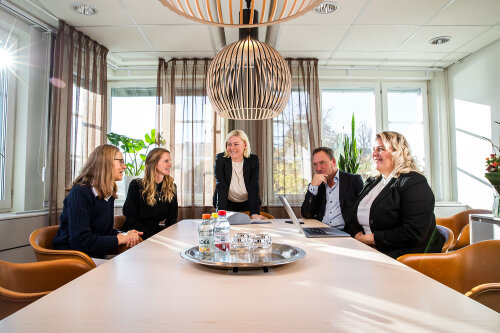Best Child Visitation Lawyers in Falun
Share your needs with us, get contacted by law firms.
Free. Takes 2 min.
Free Guide to Hiring a Family Lawyer
List of the best lawyers in Falun, Sweden
About Child Visitation Law in Falun, Sweden
Child visitation, known as "umgängesrätt" in Swedish, refers to the legal right for a child to maintain contact and spend time with the parent they do not primarily live with, as well as with other important persons in their life. In Falun, Sweden, these rights and responsibilities are governed largely by Swedish national law, but local authorities such as social services in Falun often play a central role in resolving issues and supporting families when disputes arise. The overall focus in Swedish law is ensuring the best interests of the child are protected and that children have access to both parents whenever possible.
Why You May Need a Lawyer
There are several common situations where individuals seek legal support for child visitation issues in Falun. Disputes can arise about how much time the child should spend with each parent, disagreements regarding holidays or travel, concerns over the child's safety, or one parent possibly preventing contact with the other parent. Sometimes, circumstances change over time and require modifications to previous agreements or court decisions regarding visitation. In complex situations involving international families, unresolved conflicts, or allegations of abuse, the guidance of a legal professional experienced in Swedish family law is particularly important. A lawyer can help you understand your rights, negotiate with the other party, and represent you in court or mediation proceedings if required.
Local Laws Overview
Swedish law, including provisions from the Parental Code (Föräldrabalken), governs child visitation arrangements in Falun. Under the law, both parents retain responsibility for the child regardless of their relationship status, unless a court decides otherwise. The primary principle is the child's best interests, which always takes priority. Parents are expected to come to an agreement on visitation. If this is not possible, the social services in Falun can assist with mediation and help work out a parenting agreement. In cases where agreement cannot be reached, either parent can apply to the local court (Falu tingsrätt) for a binding decision. These decisions are based on the specific circumstances of the family, with the child's views and needs considered. If there is concern about harm to the child, the court may restrict or deny visitation.
Frequently Asked Questions
What is child visitation (umgängesrätt) in Sweden?
Child visitation refers to the right of a child to meet and have ongoing contact with the parent they do not live with as well as other significant relatives or persons important for the child's wellbeing.
Who decides on visitation arrangements if parents cannot agree?
If parents cannot come to an agreement, they can seek assistance from social services in Falun for mediation. If an agreement is not possible, the matter can be taken to the local district court, which will make a decision based on the best interests of the child.
What factors does the court consider when deciding on visitation?
The court considers many factors such as the child's age, health, attachment to each parent, their own wishes depending on maturity, and whether there are any risks to the child's safety or wellbeing.
Can a child refuse visitation with a parent?
The child's wishes are taken into account, especially as they get older and more mature. The court will consider why the child refuses visitation and whether it aligns with their best interests.
Is visitation always supervised?
No. Supervised visitation is only ordered if necessary to protect the child's safety or if there are concerns about the child's wellbeing with the non-custodial parent.
What if the custodial parent refuses visitation?
If one parent prevents agreed-upon or court-ordered visitation without a valid reason, the other parent can seek assistance through social services or apply to the court to enforce visitation rights.
How does COVID-19 or illness affect visitation?
Temporary illness or public health concerns may lead to adjustments in visitation arrangements, but these should be discussed and mutually agreed upon whenever possible. Major changes require court approval if parents cannot agree.
Can visitation be changed after the original agreement?
Yes, visitation arrangements can be amended if circumstances change significantly. This can be done voluntarily between the parents or, if not possible, through assistance from social services or the court.
Does the child have any say in visitation arrangements?
Yes, the child's wishes are considered, and greater weight is given to their views as they get older and more mature. Social services or the court may speak directly with the child in appropriate cases.
Do grandparents or other relatives have visitation rights?
The law allows for important persons in the child's life, such as grandparents, to have visitation rights if it is in the best interests of the child. This is decided on a case by case basis.
Additional Resources
If you are seeking help with child visitation, several organizations and authorities can provide guidance:
- Falun Social Services (Socialtjänsten Falun) - Offers support and mediation for parents.
- Falu District Court (Falu tingsrätt) - Handles court applications for child visitation decisions.
- The Swedish National Board of Health and Welfare (Socialstyrelsen) - Provides national guidelines on family law.
- Legal Advice Centers in Falun - Many offer initial free legal counseling (rådgivning).
- Family law specialists (advokatbyråer) in Falun - Can offer representation and tailored advice.
Next Steps
If you need legal assistance for child visitation in Falun, start by gathering all relevant documentation, such as existing agreements, court orders, and records of communication with the other parent. Contact your local social services for an initial discussion or mediation support, as many issues can be resolved without court involvement. If you cannot reach an agreement, consider consulting with a qualified family lawyer who specializes in Swedish child law for advice tailored to your situation. They can guide you through the process, explain your options, and help with court applications if necessary. Remember, the focus is always on the best interests of your child and finding workable solutions that support their wellbeing.
Lawzana helps you find the best lawyers and law firms in Falun through a curated and pre-screened list of qualified legal professionals. Our platform offers rankings and detailed profiles of attorneys and law firms, allowing you to compare based on practice areas, including Child Visitation, experience, and client feedback.
Each profile includes a description of the firm's areas of practice, client reviews, team members and partners, year of establishment, spoken languages, office locations, contact information, social media presence, and any published articles or resources. Most firms on our platform speak English and are experienced in both local and international legal matters.
Get a quote from top-rated law firms in Falun, Sweden — quickly, securely, and without unnecessary hassle.
Disclaimer:
The information provided on this page is for general informational purposes only and does not constitute legal advice. While we strive to ensure the accuracy and relevance of the content, legal information may change over time, and interpretations of the law can vary. You should always consult with a qualified legal professional for advice specific to your situation.
We disclaim all liability for actions taken or not taken based on the content of this page. If you believe any information is incorrect or outdated, please contact us, and we will review and update it where appropriate.









